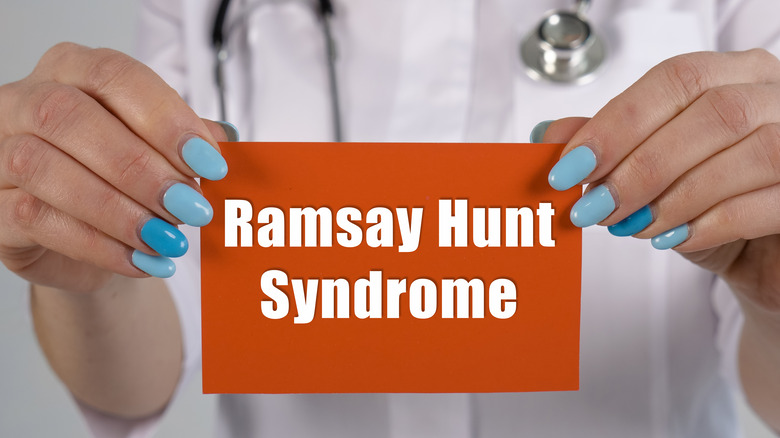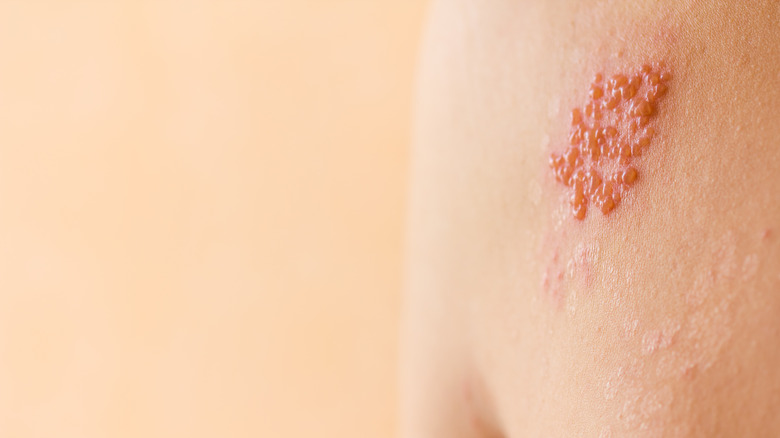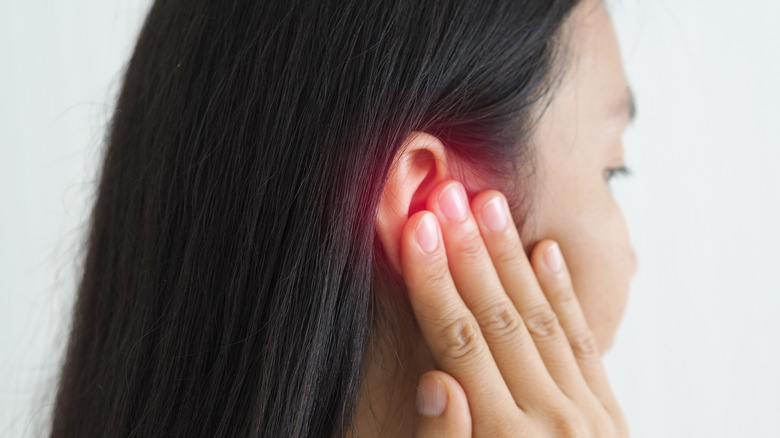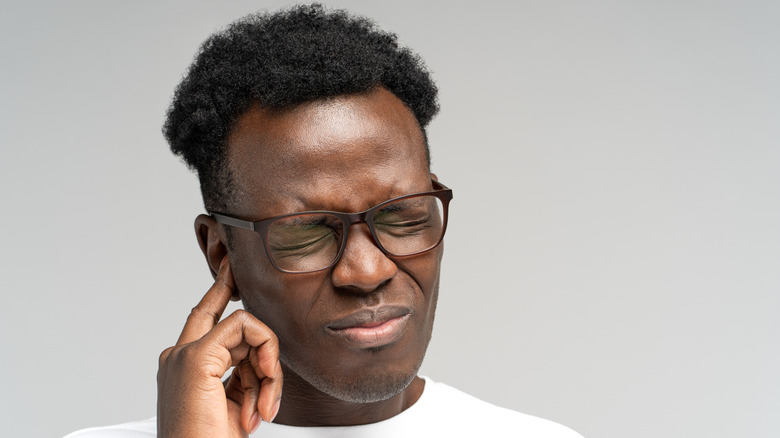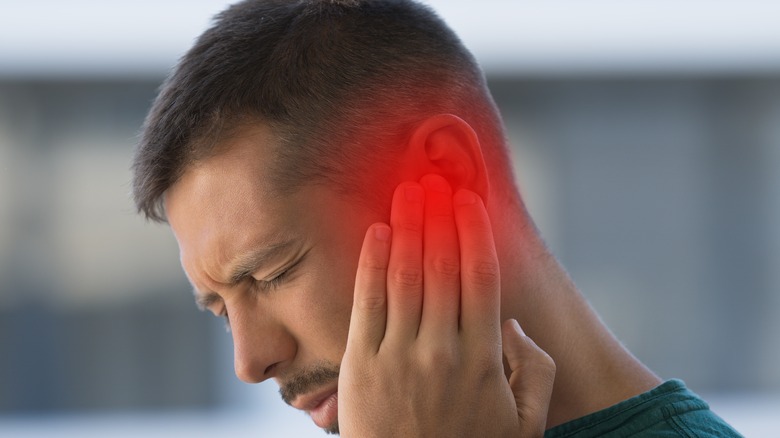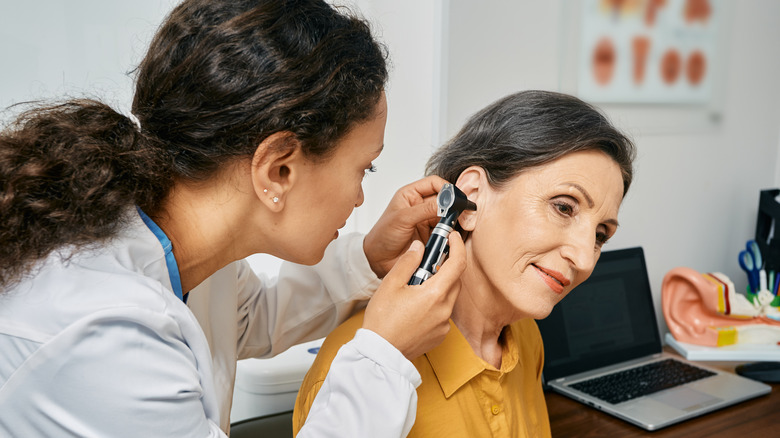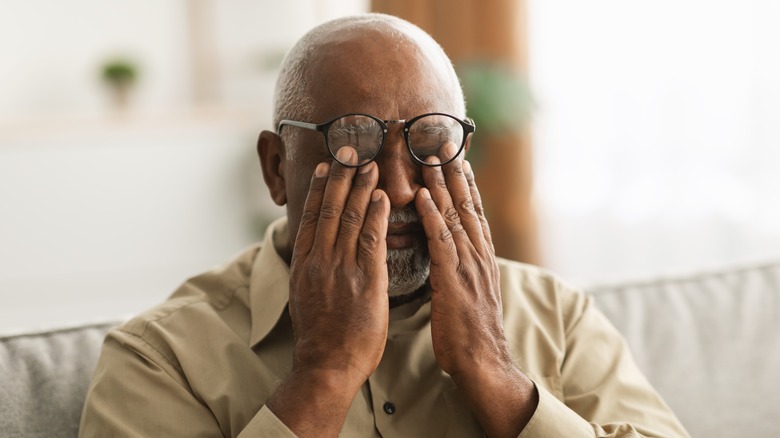Ramsay Hunt Syndrome Explained: Everything You Need To Know
Ramsay Hunt Syndrome is a neurological condition that can cause facial paralysis and other complications, according to Ramsay Hunt Syndrome (via the National Library of Medicine). The syndrome is named after James Ramsay Hunt, the neurologist who first identified this condition as well as two others related to it. Of those conditions, Ramsay Hunt Syndrome is the most rare. The Cleveland Clinic estimates that this condition affects approximately one out of 20,000 people in the U.S. every year.
Although it's rare, Ramsay Hunt Syndrome is a complication of a very common virus, so anyone who has been infected with this virus has the potential to get Ramsay Hunt Syndrome. Thankfully, there's a vaccine that can reduce your risk of developing the condition. Speaking to Healthline, Dr. Ashley Lipps of The Ohio State University Wexner Medical Center explains that the shingles vaccine can help to protect against both shingles and Ramsay Hunt Syndrome. Read on to learn more about what causes this health condition and who is at risk, as well as common symptoms, complications, and treatment.
It's caused by the same virus that causes chickenpox and shingles
If you've ever had chickenpox, then you've been infected with the varicella-zoster virus. Johns Hopkins Medicine estimates that more than 90% of American adults had chickenpox at some point growing up. However, a chickenpox vaccine (the varicella vaccine) that's been in use since 1995 has substantially reduced the incidence of chickenpox in children. Adults who've never had chickenpox can still develop it, and the symptoms may be even more severe (via Healthline). As such, the chickenpox vaccine is recommended for children as well as adults who've never had chickenpox.
In addition to chickenpox, the varicella-zoster virus can cause shingles and Ramsay Hunt Syndrome in those who've previously had chickenpox. Although children recover from chickenpox, the virus can stay dormant in the body for many years and cause different types of infections later in life, including shingles and Ramsay Hunt Syndrome (via the Mayo Clinic). The National Institute on Aging suggests that as many as one in three people will develop shingles. Ramsay Hunt Syndrome is more rare, affecting less than 1% of people who develop shingles (via Ramsay Hunt Syndrome).
Ramsay Hunt Syndrome is the result of a specific type of shingles outbreak
As explained by the Mayo Clinic, Ramsay Hunt Syndrome happens as the result of a specific type of shingles outbreak. Typical shingles outbreaks can cause itchy, painful rashes on the skin, but in the case of Ramsay Hunt Syndrome, the shingles outbreak occurs near one of your ears, adjacent to the facial nerve. Those with Ramsay Hunt Syndrome often experience a painful rash similar to a shingles outbreak, but the rash also impairs the facial nerve. More specifically, it causes inflammation of the facial nerve, which can lead to partial facial paralysis (via Ramsay Hunt Syndrome). A variety of other complications can ensue, depending on which specific nerve fibers are affected.
Even if you've never had shingles, you can still develop Ramsay Hunt Syndrome as long as you've had chickenpox (via the Cleveland Clinic). What's more, if you've already had shingles, you may be at an increased risk to get it again, or to develop Ramsay Hunt Syndrome. According to Dr. Barbara Yawn, director of research at Olmsted Medical Center in Rochester, Minnesota, having pain from shingles that lasts longer than 60 days makes a recurrent shingles outbreak about five times more likely (via WebMD).
Anyone who has had chickenpox could develop Ramsay Hunt Syndrome
Ramsay Hunt Syndrome is fairly rare, affecting about one in 20,000 Americans annually (via the Cleveland Clinic). That said, anyone who has had chickenpox can theoretically develop this condition. The varicella-zoster virus that causes chickenpox often remains dormant in the body for years, even decades, after you've recovered from chickenpox. If the virus becomes "re-activated" in your body, it can lead to a flare-up of shingles, and possibly Ramsay Hunt Syndrome.
The chickenpox vaccine protects against all the conditions caused by the varicella-zoster virus — chickenpox, shingles, and Ramsay Hunt Syndrome — but it is still possible to develop Ramsay Hunt Syndrome after taking the chickenpox vaccine. According to an article from the Journal of Dr. Behcet Uz Children's Hospital, Ramsay Hunt Syndrome is extremely rare in those who've received the chickenpox vaccine, but there have been a few documented cases.
Ramsay Hunt Syndrome is more common in the elderly
According to the Centers for Disease Control and Prevention (CDC), the likelihood of developing shingles increases with age — and so, consequently, does the risk of developing Ramsay Hunt Syndrome, which is most common in those over age 60, though in rare cases children can develop it as well (via Cleveland Clinic). The CDC recommends that all adults who have weakened immune systems or are over the age of 50 get the shingles vaccine in order to lower their risk. This includes adults who previously had the chickenpox vaccine.
The vaccine is available as two separate shots taken two to six months apart. For those with weakened immune systems, the second dose of the vaccine may need to be taken sooner, within one to two months. The CDC claims the shingles vaccine is more than 90% effective at preventing shingles, providing strong immunity for up to seven years after receiving the vaccine. You can take the shingles vaccine if you've had shingles in the past — it will still help to prevent flare-ups in the future — but the CDC warns not to get the vaccine if you currently have shingles.
Ramsay Hunt Syndrome is rare and sometimes mistaken for more common disorders
Ramsay Hunt Syndrome is considered rare, but it's possibly more common than we think (via Cleveland Clinic). Because of its reputation as a rare disease, the National Organization for Rare Disorders (NORD) says it is sometimes mistaken for other health disorders that are more common, such as Bell's palsy, which also causes facial paralysis. In fact, Cancer Therapy Adviser estimates that as many as 20% of Bell's palsy cases in the U.S. are actually misdiagnosed cases of Ramsay Hunt Syndrome. If true, the actual number of people with Ramsay Hunt Syndrome may be a little higher than what health data suggests.
An article from the Journal of Western Medicine suggests that about 23 out of 100,000 people are diagnosed with Bell's palsy each year, more than four times the number of people who are diagnosed with Ramsay Hunt. If 20% of these cases are actually Ramsay Hunt Syndrome, this would make Bell's palsy approximately twice as common as Ramsay Hunt Syndrome, not four times as common. Other conditions that are sometimes confused with Ramsay Hunt Syndrome include acoustic neuroma and trigeminal neuralgia.
Symptom: rash in or next to the ear
One of the most common symptoms of Ramsay Hunt Syndrome is a rash near the ear, which is very close to the facial nerve (via Ramsay Hunt Syndrome). This is technically a shingles rash, since the syndrome is a specific type of shingles outbreak. This rash may be itchy or painful, and it may cause secondary symptoms such as bacterial infection of shingles blisters (via the Mayo Clinic). A person with a shingles rash is contagious until their rash scabs over and should keep their rash covered as it heals in order to prevent spreading the virus (and to keep the rash from getting infected).
Ramsay Hunt Syndrome can also occur with no rash. Though rare, shingles can develop without a visible rash (via Healthline). Those who have shingles with no rash may still experience itchiness and painful sensations as well as other symptoms of shingles.
Because Ramsay Hunt Syndrome without a rash is rare, it's sometimes misdiagnosed as other diseases. According to Cancer Therapy Adviser, some patients diagnosed with Bell's palsy may actually have had Ramsay Hunt Syndrome, but were misdiagnosed in part because no rash was present.
Symptom: facial palsy
Ramsay Hunt Syndrome causes inflammation in the facial nerve (via Ramsay Hunt Syndrome). As such, it can lead to partial facial paralysis on the side of the face where the nerve is affected. People who experience this facial paralysis may have trouble blinking their eye on the affected side, and they may also have trouble closing part of their mouth, which can make speaking and eating particularly difficult. In some cases, the facial muscles will be weak or stiff, but in others, they won't be able to move at all.
According to NORD, it's possible to have Ramsay Hunt Syndrome without facial paralysis. Additionally, the facial rash doesn't always occur alongside facial paralysis. Those who do experience facial paralysis should seek treatment right away, as this has the potential to become permanent. A review from the International Archives of Otorhinolaryngology says early detection and treatment is the best way to reduce the risk of facial paralysis becoming permanent.
Symptom: tinnitus
Another common symptom of Ramsay Hunt Syndrome is tinnitus, or ringing in the ears. This makes sense, as the condition affects the facial nerve, which is very close to the ear (via Ramsay Hunt Syndrome). In addition to tinnitus, hearing loss may also be present with Ramsay Hunt Syndrome (via NORD). Hearing loss is usually temporary, but it has the potential to become permanent in rare cases.
The best way to treat tinnitus is to treat the underlying cause (i.e. Ramsay Hunt Syndrome), but there are other things you can do to alleviate the symptom. Masking the noise may help, according to the Mayo Clinic. This can be done by playing white noise or listening to other background noise that makes the tinnitus less noticeable. Of course, you should avoid turning the volume up to an unsafe level to drown out the sounds associated with tinnitus, as exposure to loud noises actually worsens the effects of tinnitus in the long term.
Symptom: ear pain
In addition to tinnitus and temporary hearing loss, Ramsay Hunt Syndrome can also cause ear pain (via the NORD). This would most likely be experienced in one ear, but it could occur in both. Ear pain from Ramsay Hunt Syndrome can be very severe, and in some cases it can spread to the neck. Sometimes this pain may be associated with a rash near the ear, but ear pain can also occur independently of a rash.
Apart from treating Ramsay Hunt Syndrome, other things can be done to ease pain that's otherwise unbearable. The Mayo Clinic recommends taking over-the-counter painkillers such as ibuprofen when dealing with pain caused by Ramsay Hunt Syndrome, though in some cases prescription painkillers may be needed when over-the-counter painkillers aren't enough. When pain is caused by a rash, the Mayo Clinic also recommends applying a cool, wet compress to the rash to help alleviate the pain.
Long-term complication: hearing loss
Ear pain, tinnitus, and temporary hearing loss are all symptoms of Ramsay Hunt Syndrome (via the NORD). However, in some cases, hearing loss may become permanent. Hearing loss can occur in one or both ears, and it is more likely to become permanent if the condition goes untreated for an extended period of time.
As explained by Mount Sinai, a complete recovery from Ramsay Hunt Syndrome symptoms is most likely if treatment begins within three days of the onset. In such cases, you may be fully recovered within a few weeks. However, in other cases, the condition can last for months without healing. This is more likely to happen when treatment doesn't begin right away, and it is more likely to lead to permanent complications, such as hearing loss. For this reason, you should contact your healthcare provider right away if you experience any of the symptoms of Ramsay Hunt Syndrome.
Long-term complication: eye damage
Another long-term complication associated with Ramsay Hunt Syndrome is eye damage (via Mount Sinai). This can result in a loss of vision in the affected eye. This may happen as a consequence of facial paralysis: The eye on the side of the face experiencing paralysis has trouble blinking, which can lead to dry eye, eye infection, and swelling of the cornea (via Healthline). All of these complications constitute eye damage, and the longer they go untreated, the greater the risk of permanent complications. Those with Ramsay Hunt Syndrome have the best chance of making a full recovery if treatment can begin within three days of whenever the symptoms first started (via Mount Sinai).
To help minimize eye damage with Ramsay Hunt Syndrome, the Mayo Clinic recommends using moisturizing eye drops if you notice your eye(s) becoming dry. Additionally, they recommend applying ointment to the eye at night, and sleeping with an eye patch and/or using tape to help keep your eye shut during the night.
Treatment: antiviral medication
As Ramsay Hunt Syndrome is caused by a virus (specifically the varicella-zoster virus), one of the most effective treatments is antiviral medication. According to a case report from the Medical Journal of Armed Forces India, Ramsay Hunt Syndrome may be treated with oral acyclovir, an antiviral drug. The study claims that beginning to take acyclovir as early as possible after the onset of Ramsay Hunt Syndrome can help both to speed up the recovery process and to reduce the risk of long-term complications of the health condition.
Acyclovir isn't just used to treat Ramsay Hunt Syndrome. The Mayo Clinic says this antiviral drug can be used to treat chickenpox and shingles (the other health conditions caused by the varicella-zoster virus) as well as genital herpes infections.
That said, an article from Evidence-Based Dentistry claims some evidence suggests that antiviral medications taken alongside corticosteroids are not any more effective at treating Ramsay Hunt Syndrome than corticosteroids alone. In other words, the effects of the antiviral agents may be negligible. However, it should be noted that very few studies exist that test the effects of antiviral agents as a treatment for Ramsay Hunt Syndrome, so more research on this topic is needed.
Treatment: steroids
Corticosteroids are another popular treatment for Ramsay Hunt Syndrome (via the NORD). It's often recommended to take antiviral drugs alongside corticosteroids. According to an article from the Journal of Dental Anesthesia and Pain Medicine, steroids are powerful anti-inflammatory agents that can help improve the symptoms of Ramsay Hunt Syndrome. Per the article authors, the steroid prednisone taken alongside the antiviral drug acyclovir could help prevent nerve degeneration, raising the recovery rate of facial paralysis.
While the steroids prescribed for Ramsay Hunt Syndrome are usually taken orally, a study from JAAD Case Reports suggests topical steroids may also be prescribed in order to help heal any painful and itchy rashes. However, steroids should always be used with care, as long-term use of these drugs can create additional problems. For instance, according to a review from the Journal of Clinical Gastroenterology, long-term use of corticosteroids can lead to osteoporosis and problems with the joints, stomach, eyes, or liver, among other things.
Most patients with Ramsay Hunt Syndrome make a full recovery
According to Dr. Michael Ison of the Northwestern Feinberg School of Medicine, most people who are diagnosed with Ramsay Hunt Syndrome will make a full recovery with no permanent or long-term complications (via The New York Times). Complete recovery is most likely to happen if treatment begins within three days of the development of symptoms (via Mount Sinai). In other words, prompt treatment is the best defense against permanent damage. For this reason, you should speak with your healthcare provider right away if you experience any of the symptoms of Ramsay Hunt Syndrome.
It also helps to be vaccinated. Those who've had the chickenpox vaccine and/or the shingles vaccine may still develop Ramsay Hunt Syndrome, but these cases are rare and generally more mild than cases that develop in unvaccinated people. To help prevent shingles and Ramsay Hunt Syndrome, the CDC recommends the shingles vaccine for everyone over 50 years of age.

